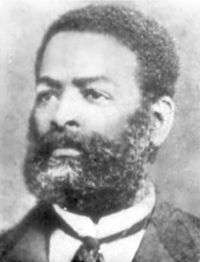Luís Gama
| Luís Gama | |
|---|---|
|
A photograph of Luís Gama | |
| Born |
Luís Gonzaga Pinto da Gama 21 June 1830 Salvador, Bahia, Brazil |
| Died |
24 August 1882 (aged 52) São Paulo City, São Paulo, Brazil |
| Pen name | Getulino |
| Occupation | Lawyer, poet, abolitionist, journalist |
| Nationality |
|
| Alma mater | University of São Paulo |
| Notable works | Primeiras Trovas Burlescas de Getulino |
Luís Gonzaga Pinto da Gama (June 21, 1830 — August 24, 1882) was a Brazilian Romantic poet, journalist, lawyer and a prominent abolitionist.
Life
Gama was born in 1830, to a Portuguese fidalgo who lost all his fortune with gambling, and Luísa Mahin (also spelled Maheu), a young woman from what is now the city of Elmina, in Ghana. She was famous for getting herself involved in many rebellions, such as the 1835 Malê Revolt and the Sabinada.
In 1840, when Gama was 10 years old, his father sold him illegally, allegedly because of debts. Gama was bought by an alférez named Antônio Pereira Cardoso. Cardoso would try to sell him, but no one would buy Gama, since he was originally from Bahia, and Bahian slaves had the fame of being runaways. Cardoso then decided to use Gama as a housekeeper in his farm in the city of Lorena.
In 1847, a student named Antônio Rodrigues de Araújo stayed in Cardoso's house. He and Gama developed a strong friendship, and Araújo taught Gama how to read and write. Thus learning about the illegality of his condition, Gama fled to São Paulo, and studied Law at the Faculdade de Direito da Universidade de São Paulo, but did not finish the course. In later life, he would work as a rábula, that is, a non-graduated lawyer with permission of the government to follow that career.
During the 1860s he became a journalist, collaborating with Angelo Agostini in Ipiranga, Coroaci and O Polichileno. He founded the journal Radical Paulistano in 1869 alongside Rui Barbosa. He also helped to create the Republican Party of São Paulo in 1873.
Gama freed more than one thousand slaves in São Paulo. He died in 1882 of diabetes.
Works
Gama would publish a poetry book, Primeiras Trovas Burlescas de Getulino (Getulino's First Burlesque Ballads), under the pen name "Getulino", in 1859. Most of the poems are satires about the customs of the 19th-century Brazilian aristocracy.
See also
- Mulatto Day
References
- GAMA, Luís. Primeiras Trovas Burlescas de Getulino e Outros Poemas (edited by Lígia Ferreira). São Paulo: Martins Fontes, 2000.
- SILVA, J. Romão. Luís Gama e Suas Poesias Satíricas. Rio de Janeiro: Casa do Estudante.
External links
| Portuguese Wikisource has original text related to this article: |
- A biography of Luís Gama (Portuguese)
|
| ||||||||||||||||||||||||||||

.svg.png)